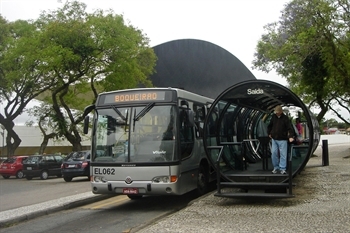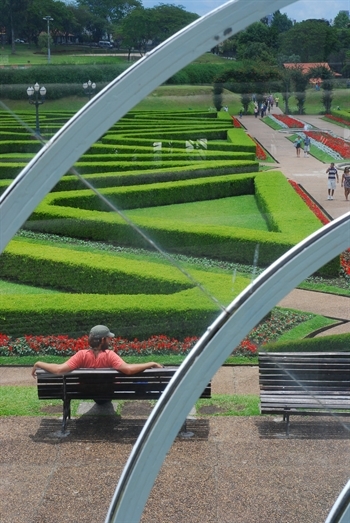
Metropolitan Planning Council
Audience members pose with Lerner as he signs books after the event.
 By Kara Riggio and MPC Research Assistant Zoe Chapin
By Kara Riggio and MPC Research Assistant Zoe Chapin - October 29, 2014
“Those who create are born again.” So says Jaime Lerner, renowned architect, author and former mayor of Curitiba, Brazil. Likewise, through a single gesture—a “pinprick”—cities can reinvent themselves, the author of Urban Acupuncture explained.
At an Urban Think & Drink on Tuesday, Oct. 21, the Metropolitan Planning Council (MPC) was honored to host Jaime Lerner, who, throughout his illustrious career, has gained an invaluable intuition of how a city moves and works. Lerner delivered a passionate treatise of the livable city as he instilled a room filled with architects, academics, planners, policy makers and urban enthusiasts with an overwhelming sense of efficacy.
Throughout his presentation, one theme remained clear: Keep people at the center of planning, and you will have a successful city: “A city is like a turtle: moving and working together.” The key tenets of a city must be mobility, sustainability and social diversity, argued Lerner, who pioneered one of the first bus rapid transit networks in Curitiba, all beginning with one “pinprick.”
“It has nothing to do with money; it has to do with people, with political will, with solidarity.” The key is to first start somewhere, says Lerner, and let residents benefit from small improvements which ultimately grow in depth or breadth.
This demonstration effect is powerful in that it allows small interventions, although simple and sometimes imperfect, to create an immediate improvement in the lives of the city’s residents. For instance, Curitiba’s bus rapid transit network began with one line, and quickly expanded to a system that now serves 2.6 million people per day!
Rather than spending generations building a metro, Lerner revolutionized transit in a city that has since grown to more than three times the size it was when Lerner was Mayor in the 1970s.

Flickr user Mariordo59 (cc)
Passengers pay before boarding the rapid transit buses in Curitiba. This, coupled with level boarding, speeds the process and makes buses more like trains.
Certainly this example has served as inspiration to dozens of cities worldwide, who have adopted similar systems. What began as a “pinprick” in Curitiba has extended transportation to millions of city dwellers globally. Chicago will also benefit from Lerner’s innovation, with plans for the first downtown underway, and another along a busy north-south arterial, Ashland Avenue. How powerful a simple, clever concept can be!
Through all this, Lerner, a captivating speaker with gusto and wit aplenty, described the imperative to put improvements to work for people. Construct a botanical garden in a matter of months, as Curitiba did, available for all to enjoy, and make small additions over time. Or transform a main shopping street into a pedestrian street, as Lerner did in a mere three days. Feats such as these show Lerner’s commitment to the ideology of simplifying solutions and showing their immediate success to the people who matter most: the city’s residents.
Likewise, MPC believes big impacts can come from small interventions. From People Spots to our Placemaking challenge, organizing and supporting efforts to transform spaces throughout the Chicago region is an integral part of MPC’s
This past summer, 14 different community organizations overhauled previously overlooked areas in their neighborhoods for one day, holding picnics, clothing swaps and an array of games and art activities. From Ravenswood to Bronzeville, MPC called upon communities to create innovative public spaces as a part of its Old Place, New Tricks challenge.
MPC has also sought to transform Chicago’s historic Union Station into a neighborhood asset for residents and the station’s 120,000 daily users. MPC’s 2013 Placemaking challenge, Activate Union Station, prompted architects, planners, designers and neighborhood groups alike to rethink the station as a place to relax and enjoy. One of our winners, trainYARD, built an indoor park complete with picnic tables and tetherball.

Flickr user Celine Massa (cc)
Curitiba's Botanical Gardens opened in 1991 after just three months of construction.
The success of these initiatives goes to show that a small amount of innovation—a little bit of urban acupuncture—can speak volumes. If a city focuses on its people, no measure is too small. This fact has long been a central tenet of MPC’s work.
Involve residents and “give people room to improve your ideas,” Lerner said, “and remember that there is beauty in imperfection.” Deliver solutions, and “as long as you have people in mind, planning does not have to be a huge increase in bureaucracy.” By implementing these “pinpricks” of change, cities across the world can create maximum benefits with minimal invasiveness all while retaining the identity of place.
Although there were countless times during Lerner’s presentation when a wave of contemplation came over the crowd, there was one particular message that seemed to resonate. Citing French philosopher René Dubos, Lerner stated, “Tendency is not destiny.” Certainly, cities, who cumulatively contribute to 75 percent of the world’s greenhouse gas emissions, face a difficult future as they start to grapple with the imperative of sustainability. However, Lerner’s message is again a simple, resoundingly aspirational one: You must start.
As Jaime Lerner caringly scribed in attendees’ book covers, “a pinprick of care” is all it takes. One measure, one improvement—whether it be a bus rapid transit line, improved green space or a bike share system—can effect powerful reverberations on the vitality of city life.